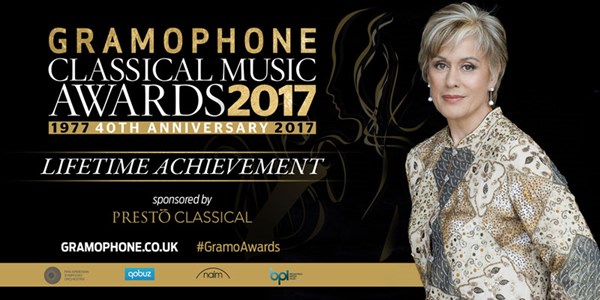Lifetime Achievement
Dame Kiri Te Kanawa
To see Dame Kiri Te Kanawa receive her award live at the Gramophone Awards ceremony, click here to watch the live stream from 6.30pm (BST)
‘Die Zeit, die ist ein sonderbar Ding’, sings the Marschallin in Hugo von Hofmannsthal and Richard Strauss’s Der Rosenkavalier – ‘Time is a strange thing’. Time for Dame Kiri Te Kanawa, one of the most admired Marschallins of our age, is not about looking back. It’s for looking forwards. ‘I get bored talking about the past’, she says, a line Hofmannsthal might easily have dropped into one of his librettos.
Dame Kiri may have stopped singing publicly (‘No, I don’t miss it’), but she certainly doesn’t consider herself retired. She maintains a busy schedule overseeing her Foundation, an organisation to help future generations of singers. ‘Some of my students say to me, “How can I repay you for what you’ve done for me?” I reply, “Just be successful!”’ And if anyone has experienced success it is this possessor of one of the loveliest voices of modern times. That great connoisseur of the voice (and one of Gramophone’s best-loved contributors) John Steane commented of Te Kanawa’s ‘Dove sono’ (Le nozze di Figaro) that ‘the legato is perfect, the style aristocratic, the tone at its loveliest’, and drew comparisons with Meta Seinemeyer (and from JBS that was high praise indeed).
It’s exactly 25 years since Gramophone bestowed its Artist of the Year Award on Dame Kiri. That year, 1992, had been an extraordinary one for her when it came to recordings: we’d had Richard Strauss’s Der Rosenkavalier from EMI, conducted by Haitink, a second recording of the Four Last Songs from Decca, conducted by Solti, Johann Strauss’s Die Fledermaus from Philips, conducted by André Previn, as well as an album of songs by Michel Legrand (to add to a sizeable lighter catalogue that included Gershwin, Bernstein, Kern and Rodgers and Hammerstein).
As we celebrate Kiri Te Kanawa’s career with the Lifetime Achievement Award, we must be thankful that she lived through one of the richest periods for recordings and had the fortune to record for companies with great operatic heritages: Decca, EMI, Philips and CBS/Sony Classical. She enjoyed recording because, she says, ‘I liked the idea of getting things down while my voice was still in good shape. I always felt that while it was still there and still with a sweet quality to it, the more we could capture the better. Getting it perfect wasn’t my idea; having long takes was. It had to be a performance; not spliced together.’ And she got the chance to record all her major roles (sometimes more than once: especially with the increased interest in DVD).
‘I always said as I went along, throughout my career, that I never got it perfect’, she revealed. ‘I never got it totally as I wanted it. I suppose that was quite an achievement, never getting it to the point of perfection. I never did. But I got as close as I could. Sometimes your colleagues were good, sometimes not so good. Sometimes the conducting wasn’t so good. I always had a sort of octopus view of things, tentacles everywhere, to see if it was going right or wrong. I suppose the Met went very right on a lot of occasions. But when you’ve got 4000 people in the audience and they have 4000 different ideas, you don’t know if you’re singing to a friendly group or an unfriendly group, so you have to hope!’
Dame Kiri’s voice might have been made for the music of Mozart and Strauss, and her recordings of operas (and choral works and songs) by those two composers remain particularly cherishable: her Capriccio Countess was a glorious characterisation, as was her Arabella; and in Mozart we have her Pamina, Countess Almaviva, Donna Elvira (particularly fine both under Sir Colin Davis and in the classic Joseph Losey film with Ruggiero Raimondi as Giovanni) and Fiordiligi, not to mention a glorious C minor Mass and some of the concert arias.
Dame Kiri has achieved what few classical singers manage, to attract a huge international audience with everything from musical theatre to grand opera, and she approached it all with the same spirit. She worked hard, she played the game (chat shows, Morecambe and Wise, constant interviews) and she gave generously of her time. Now, she has the time to devote to her extensive garden, and live the life she missed during her career. As Frederica von Stade once said to her, “We’re on a freight train, and from time to time we stop!” And, Dame Kiri continues, ‘that’s what it was like. It was like buzzing through almost 50 years of not stopping. It was an incredible life and when I look back on it, I keep thinking, “How did I have any time for anything?” It was just the music – getting ready and then doing it. I don’t think I could do it today.’ James Jolly
The 2017 Gramophone Lifetime Achievement Award is sponsored by Presto Classical
To see Dame Kiri Te Kanawa receive her award live at the Gramophone Awards ceremony, click here to watch the live stream from 6.30pm (BST)

Gramophone Digital Club
- Digital Edition
- Digital Archive
- Reviews Database
- Full website access
From £8.75 / month
Subscribe
Gramophone Full Club
- Print Edition
- Digital Edition
- Digital Archive
- Reviews Database
- Full website access
From £11.00 / month
Subscribe
If you are a library, university or other organisation that would be interested in an institutional subscription to Gramophone please click here for further information.





